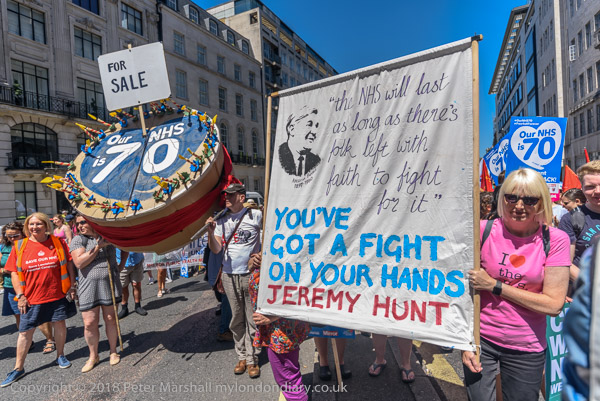
I was born before the start of the NHS but it has been there for almost all of my life, there when I’ve needed it. Some of my earliest memories are of going to the clinic where my mother was given free orange juice, which I loved, though I remember it as being rather viscous and sweet compared to the orange juice I now drink every morning at breakfast. And they also gave her cod liver oil, which was rather difficult to get me to take, though I’m now sure it did me good.
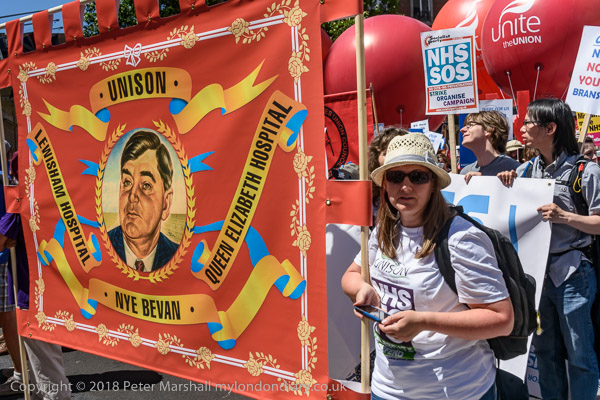
Of course the NHS wasn’t then welcomed by everyone, and was brought in against considerable opposition, both from doctors and from inside the Conservative Party. And it has never been perfect; in particular dentistry has never really been properly brought within the ambit of a health service to meet the three core needs set out by Aneurin Bevan:
- that it meet the needs of everyone
- that it be free at the point of delivery
- that it be based on clinical need, not ability to pay
and there were years when I couldn’t afford NHS treatment that have left a legacy in my current lack of real bite (though I get by.)
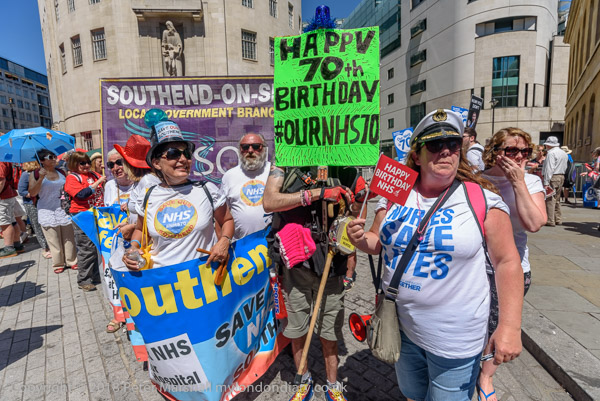
But even with this, we have moved far beyond the days of my parents, when the extraction of all of a person’s teeth and their replacement by a “full set” was a popular (and quite expensive) coming of age or wedding present. They woke every morning to see their teeth grinning at them on the bedside table in a glass tooth-mug, soaking in some tooth wash and part of the routine of rising was to put their teeth in.
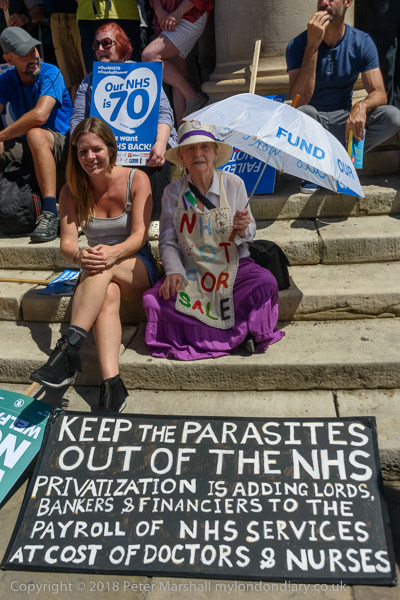
There have of course been many medical advances since July 5th 1948, and treatment under the NHS has improved greatly. When I think of the many treatments I’ve received over the past fifteen years that have kept me alive and more or less fit to work, about the only ones that would have been available back in 1948 were aspirin and the concerned care of doctors and nurses.
There have been some set-backs too. Many were appalled at the introduction of prescription charges by the Conservative government in 1952 (the 1949 Act by a Labour government had made this possible – and led to Bevan’s resignation.) They were free again for three years in the 1960s and are now £8.80 per item, 176 times the 1952 rate, though actually rather greater than this as the initial charge was ‘per form’ and since 1955 it has been ‘per item’. The amount these charges raise is relatively small in terms of the NHS budget, perhaps around £400m, mainly because almost 90% of prescribed items go to those of us who qualify for free prescriptions.
While prescriptions are now free for people living in Wales, Scotland and Northern Ireland, our current government has announced a crackdown on faudulent claims for free prescriptions in England, an expensive sledge-hammer to crack an insignificant nut. Many of those currently accused of having falsely claimed to be eligible are found to actually qualify for exemption, but have simply not applied or not kept their paperwork up to date.
The prescription crack-down is perhaps simply and example of the general Conservative apoplexy at the idea of people getting something for free that they or their friends could be profiting from. More and more aspects of our NHS treatment are now being handed over to private companies to deliver, and the NHS is continually being weakened by this back-door privatisation, sliding slowly into the hands of healthcare businesses. And once this process is more or less complete – unless we get a government that reverses it – those companies will be keen to go further, to move to a US-style insurance-based system with exorbitant medical costs and people being turned away because they have conditions their insurance does not cover or because they have been unable to afford the insurance payments.
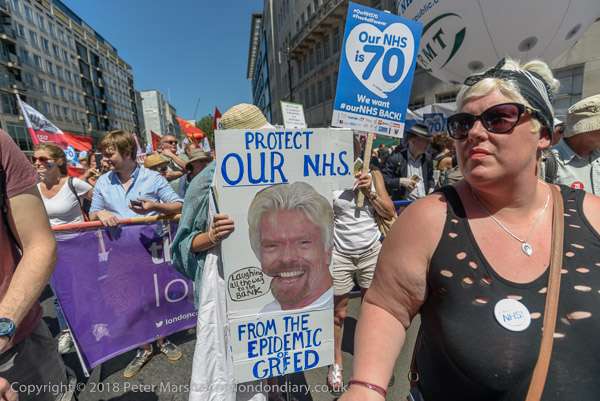
And, as I point out on My London Diary, those in government who legislate the future of our NHS have considerable legal and declared financial interests (as well as others with interests that for legal reasons they are not obliged to declare) :
“A report by Social Investigations in 2014 found 65 Conservative peers, 12 Lib-Dem peers, 37 Labour peers and 33 Crossbenchers with interests in private healthcare companies, as well as 63 Tory MPs, 3 Lib-Dems, 14 Labour members and one other. Some held directorships, others were shareholders or had received payments from companies for various services etc.”
Aneurin Bevan never actually said “The NHS will last as long as there’s folk with faith left to fight for it” though he certainly did say that people would have to fight to keep it and its principles alive. At no time in its history has it been so much under threat as now, and this march showed that there were still people prepared to fight for it, though it is hard to be confident that we will win. I’m hopeful that it will see me out, but fearful that its demise might see the death of me.
More text and far too many pictures including those of the speakers and politicians supporting the event at NHS at 70 – Free, for all, forever
______________________________________________________
There are no adverts on this site and it receives no sponsorship, and I like to keep it that way. But it does take a considerable amount of my time and thought, and if you enjoy reading it, a small donation – perhaps the cost of a beer – would be appreciated.
My London Diary : London Photos : Hull : River Lea/Lee Valley : London’s Industrial Heritage
All photographs on this and my other sites, unless otherwise stated, are taken by and copyright of Peter Marshall, and are available for reproduction or can be bought as prints.
To order prints or reproduce images
________________________________________________________